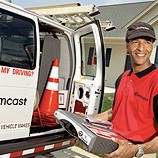NPR spoke with Daniel Roth, a senior writer at Wired Magazine, over the file sharing fiasco that Comcast found itself in about a year ago—the one where a Comcast customer discovered that the company was secretly impersonating his computer to interrupt bittorrent transmissions.
traffic shaping

Comcast Tells FCC It Doesn't Have Authority To Interfere With "Traffic Shaping"
Comcast is now claiming that the FCC “has no legal power to stop the cable giant from engaging in what it calls ‘network management practices’ (critics call it peer-to-peer traffic blocking),” reports Ars Technica. In an amazing display of spin, Comcast writes that letting the marketplace “maximize consumer welfare” has been “enormously successful” as proven by the “Comcast customer experience”—seriously, we’re not making up these phrases. On a less humorous note, the filing in which Comcast makes these claims also seems to imply that it will sue the FCC if it tries to enforce any changes on how Comcast blocks P2P traffic.

Comcast: "We Throttle Traffic To Help Other Users; Besides, It's Not Permanent"
Comcast is in heavy PR-spin mode this week following last week’s reports that they spoof customers’ computers to cancel peer-to-peer connections, and have been blocking corporate users from sending large attachments via Lotus Notes (that blockage was “fixed” last week, around the time this story broke). Comcast says that they don’t “block” anything but rather delay requests, and that it’s only done to improve overall performance for their customers.

../..//2007/10/22/trying-to-send-a-large/
Trying to send a large attachment through Lotus Notes? Comcast thinks you are a file sharing degenerate. Eat traffic shaping, office workers. [Ars Technica]


